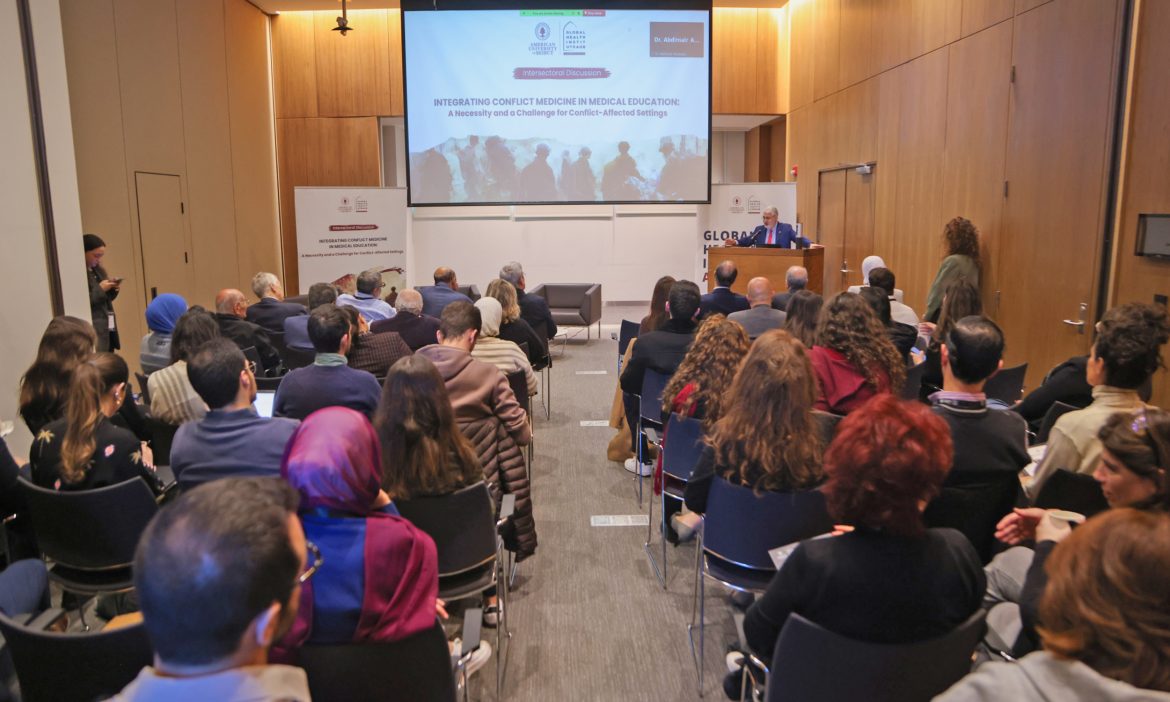The Global Health Institute (GHI) at the American University of Beirut (AUB), through its Academy Division and Conflict Medicine Program (CMP), held an event titled “Integrating Conflict Medicine in Medical Education: A Necessity and a Challenge for Conflict-Affected Settings” on January 28, 2025. Held at the Halim and Aida Daniel Academic and Clinical Center (ACC) at AUB, the event gathered key stakeholders from the medical, academic, and humanitarian sectors to discuss the urgent need for integrating conflict medicine into medical curricula.
The event commenced with opening remarks from Dr. Fadlo Khuri, president of AUB, who emphasized that universal clinical competencies alone are insufficient for conflict settings. He stressed the need for a deeper, nuanced skill set integrating biological, psychological, and sociological dimensions while addressing fragility, displacement, and recovery. Dr. Shadi Saleh, founding director of GHI, highlighted the critical gap between what healthcare professionals are learning and the realities on the ground. He underscored GHI’s commitment to equipping healthcare professionals with the skills necessary to respond effectively to emergencies in their own settings.
A keynote address was delivered by Dr. Ghassan Abu Sittah, director of the Conflict Medicine Program at GHI, who stressed that early introduction of conflict medicine helps medical students manage patients in fragile settings, reducing mortality, morbidity, and the burden on health systems. He highlighted that in conflict zones like Libya, Yemen, Gaza, and Iraq, medical professionals often learn war surgery on the battlefield rather than through structured education. He also emphasized the role of GHI’s Certificate in Conflict Medicine in bridging this gap by building the skills of healthcare practitioners in conducting research and delivering medical care that is contextualized to the settings of conflict and fragility.
Two dynamic panel discussions followed, featuring leading experts in the fields of medicine, academia, and humanitarian response. The first panel, moderated by Dr. Abu Sittah, explored the critical need for integrating conflict medicine as a core component of medical education. Panelists included Dr. Tom Potokar, founding director for Interburns and former chief surgeon at the International Committee of the Red Cross, Dr. Timothy Goodacre, past vice president of the Royal College of Surgeons of England, Dr. Abdel Nasser Abu Bakr, acting World Health Organization representative in Lebanon, and Dr. Mohammed Hiasat, trauma and acute care surgeon at the Jordanian Royal Medical Services. They shared insights on the current gaps in medical training and the need for competency-based learning tailored to conflict settings.
The second panel, moderated by Dr. Kamal Badr, deputy vice president and vice dean at the Faculty of Medicine at AUB, delved into the practical strategies, opportunities, and challenges of incorporating conflict medicine into existing curricula. The panel discussion featured distinguished panelists such as Dr. Sola Bahous, dean of Gilbert and Rose-Marie Chagoury School of Medicine at the Lebanese American University; Dr. Sami Azar, vice president for medical affairs and dean of the Faculty of Medicine and Medical Sciences at the University of Balamand; Dr. Abdel Hakim Tamimi, dean of the Faculty of Medicine at the University of Aden in Yemen; and Dr. Salah Zeineddine, associate vice president for clinical affairs, chief medical officer, and designated institutional official and assistant dean for graduate medical education at AUB. The panelists provided valuable perspectives on how universities and medical institutions can adopt structured frameworks to ensure that future healthcare professionals are adequately prepared for conflict-related medical challenges.
By initiating this dialogue, the Global Health Institute (GHI) at AUB reaffirmed its commitment to advancing conflict medicine into medical education and strengthening the capacity of healthcare professionals to operate effectively in complex and volatile environments. The event marked a significant step toward embedding conflict medicine as a fundamental pillar of medical training in the MENA region.
About GHI
The Global Health Institute (GHI) at the American University of Beirut (AUB) addresses global health challenges with a focus on context and sustainable impact by employing an interdisciplinary approach. GHI is structured into three divisions: The Programs Division, which leads research, policy, and advocacy efforts; the Academy Division, which provides capacity-building initiatives for diverse populations; and the ASSIST Division, which supports community-level actors, particularly non-governmental organizations, with a range of services and resources.
About AUB
Founded in 1866, the American University of Beirut bases its educational philosophy, standards, and practices on the American liberal arts model of higher education. A teaching-centered research university, AUB has more than 750 full-time faculty members and a student body of over 8000 students. AUB currently offers more than 140 programs leading to bachelor’s, master’s, MD, and PhD degrees. It provides medical education and training to students from throughout the region at its Medical Center that includes a full-service 365-bed hospital.
Stay up to date on AUB news and events.
aub.edu.lb |Facebook |X

